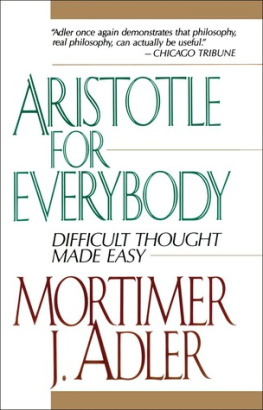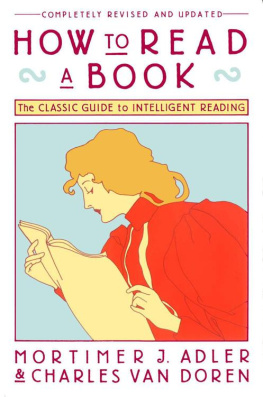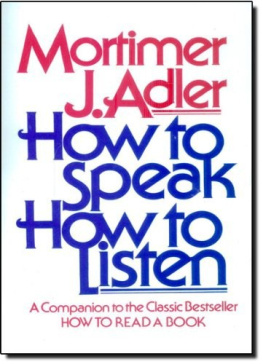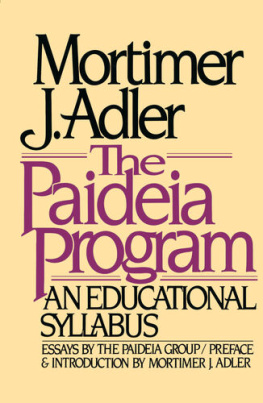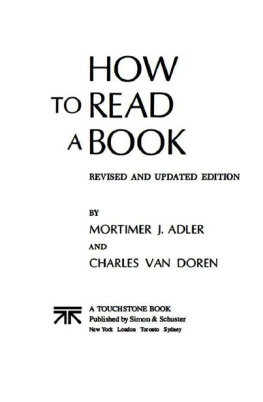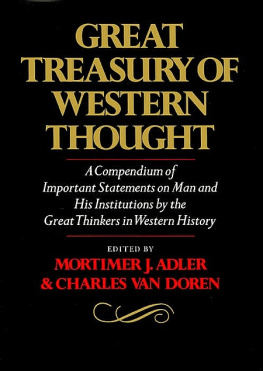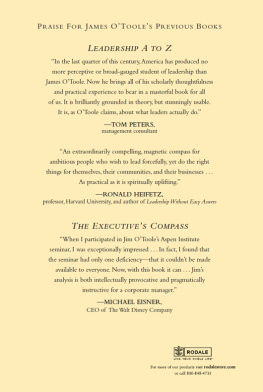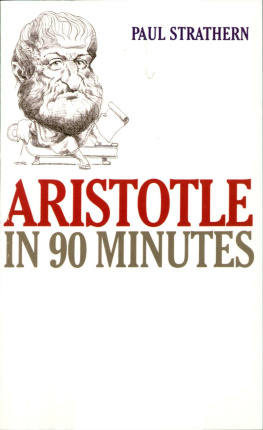INTRODUCTION
Why Aristotle?
Why for everybody?
And why is an exposition of Aristotle for everybody anintroduction to common sense?
I can answer these three questions better after I haveanswered one other. Why philosophy? Why should everyone learn how to thinkphilosophicallyhow to ask the kind of searching questions that children andphilosophers ask and that philosophers sometimes answer?
I have long been of the opinion that philosophy iseverybody's businessbut not in order to get more information about the world,our society, and ourselves. For that purpose, it would be better to turn to thenatural and the social sciences and to history. It is in another way thatphilosophy is usefulto help us to understand things we already know,understand them better than we now understand them. That is why I thinkeveryone should learn how to think philosophically.
For that purpose, there is no better teacher thanAristotle. I do not hesitate to recommend him as the teacher to begin with. Theonly other teacher that I might have chosen is Plato, but in my judgment he issecond best. Plato raised almost all the questions that everyone should face;Aristotle raised them too and, in addition, gave us clearer answers to them.Plato taught Aristotle how to think philosophically, but Aristotle learned thelesson so well that he is the better teacher for all of us.
Since we are concerned with learning how to think the wayAristotle did, what Aristotle thought is more important than who he was or whenand how he lived. The centuries and the changes that separate him from us maymake the conditions of his life and the society in which he lived appearstrange to us; but, as I will try to explain, they do not make either the styleor the content of his thinking strange to us.
Aristotle was born in 384 B.C. in the Macedonian town ofStagira on the north coast of the Aegean Sea. His father was a physician in thecourt of the King of Macedonia. The King's grandson became Alexander the Great,to whom Aristotle later became both tutor and friend.
At the age of eighteen, Aristotle took up residence inAthens and enrolled in Plato's Academy as a student of philosophy. It was notlong before Plato found Aristotle a troublesome student who questioned what hetaught and openly disagreed with him. When Plato died, and Alexander became theruler of Greece, Aristotle opened his own school, the Lyceum. That was in 335B.C.
The Lyceum had a fine library, an extensive collection ofmaps, and a zoo in which Aristotle collected specimens of animal life. It hasbeen said that some of these were sent to him by Alexander from the countrieshe conquered. When Alexander died in 323 B.C., Aristotle exiled himself fromAthens to one of the Aegean islands. He died there a year later at the age of63.
Aristotle lived in a society in which the citizens hadfree time to enjoy the pursuits of leisure because they had slaves to take careof their estates and to do menial work. It was also a society in which womenoccupied an inferior position. Plato, in projecting the institutions of anideal state, proposed that all political offices, except that of military leader,should be open to women, because he regarded men and women as essentiallyequal; but Aristotle accepted the more conventional view of his day concerningthe inferiority of women.
I shall have more to say in a later chapter aboutAristotle's views with regard to slavery and to women. Here I want to say atonce that my use of the words "man," "men," and"mankind" in their generic sense to stand for human beings of bothgenders, and not just for the male portion of the population, is in no way anindication that I share Aristotle's view about women. On the contrary, withregard to this point, I am a Platonist.
There may be some persons who regard Aristotle's antiquityas a disadvantage. They may feel that it would be much better to select as ateacher someone alive todaysomeone acquainted with the world in which we live,someone who knows what modern science has discovered about that world. I do notagree with them.
Though Aristotle was a Greek who lived twenty-fivecenturies ago, he was sufficiently acquainted with the main outlines of theworld in which we live to talk about it as if he were alive today. As an aid toour being able to think philosophically, Aristotle would not be a betterteacher even if he were acquainted with everything that modern scientists know.
In an effort to understand nature, society, and man,Aristotle began where everyone should beginwith what he already knew in thelight of his ordinary, commonplace experience. Beginning there, his thinkingused notions that all of us possess, not because we were taught them in school,but because they are the common stock of human thought about anything andeverything.
We sometimes refer to these notions as our common senseabout things. They are notions that we have formed as a result of the commonexperience we have in the course of our daily livesexperiences we have withoutany effort of inquiry on our part, experiences we all have simply because weare awake and conscious. In addition, these common notions are notions we areable to express in the common words we employ in everyday speech.

